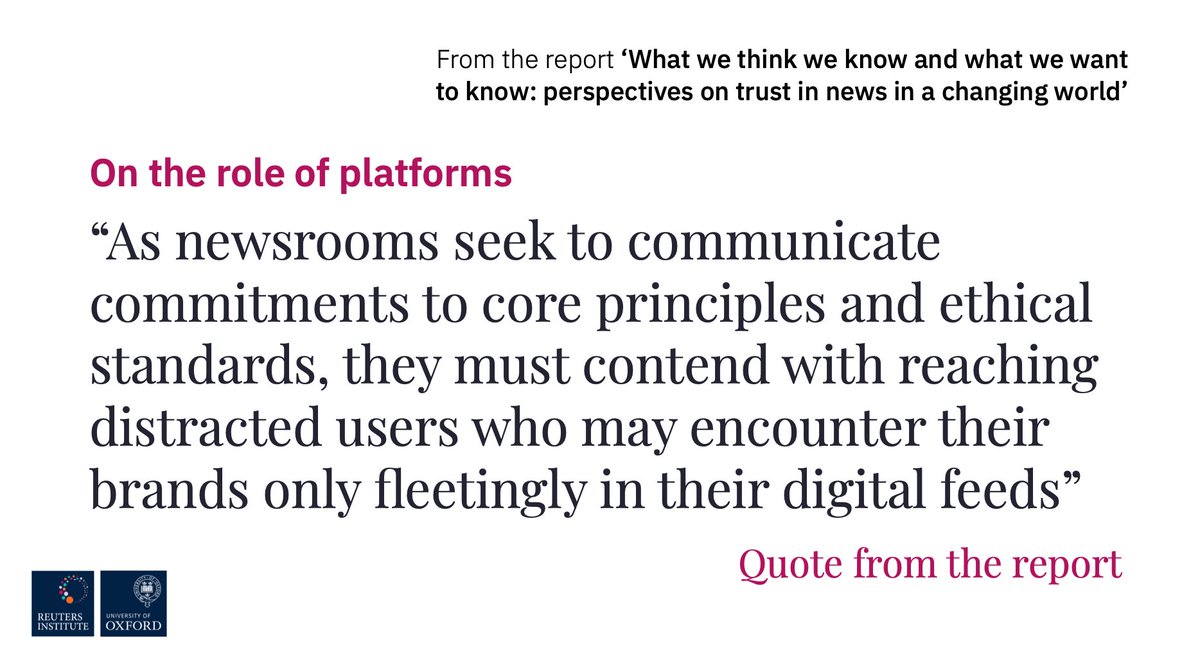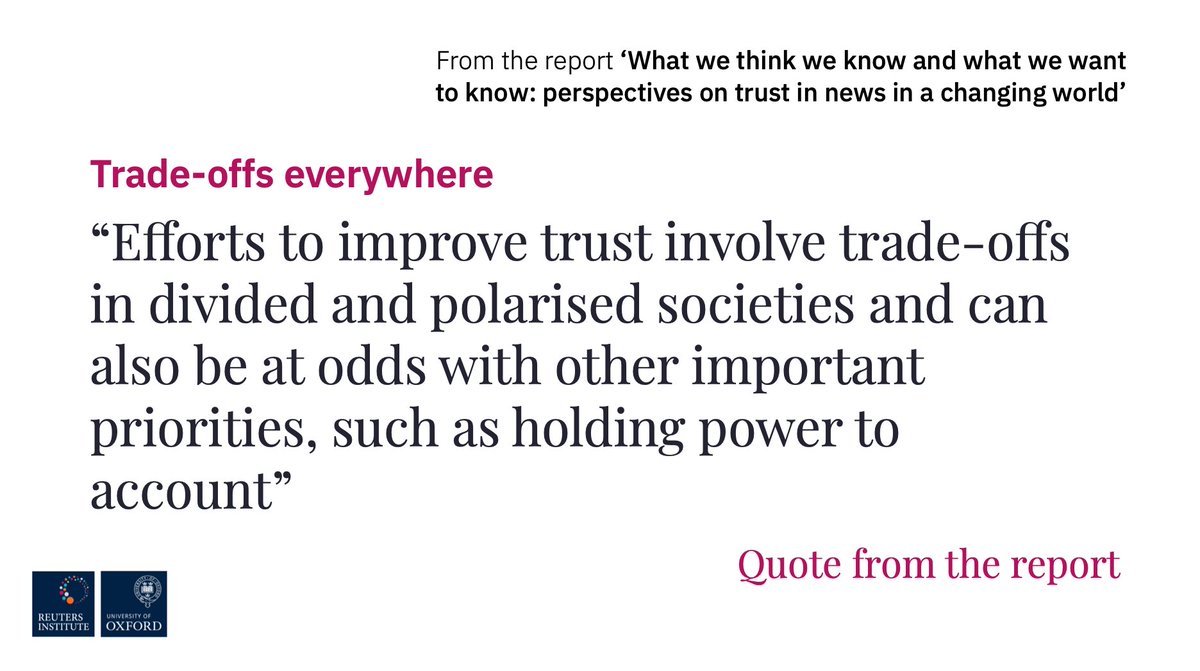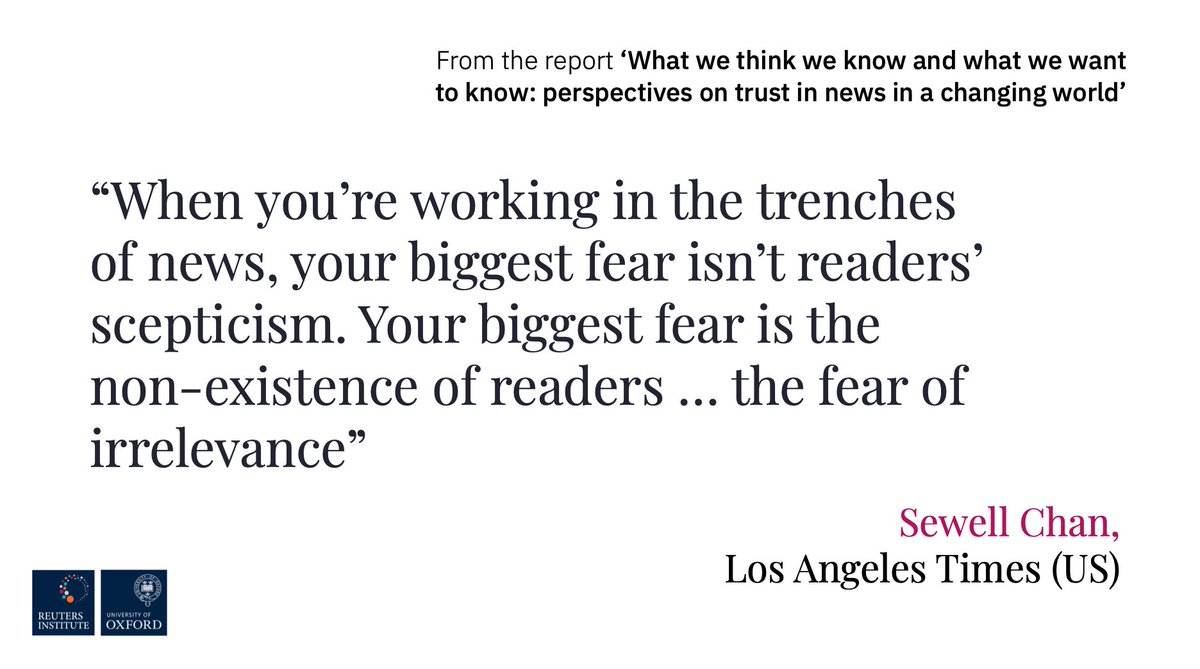 Why is trust in news eroding? What might be done about it?
Why is trust in news eroding? What might be done about it?These are the questions at the heart of a new report that looks at the trade-offs news organisations face when trying to regain trust and retain it
 Read it here
Read it herehttps://reutersinstitute.politics.ox.ac.uk/what-we-think-we-know-and-what-we-want-know-perspectives-trust-news-changing-world
 Key findings in thread
Key findings in thread
Here are 4 things we think we know about trust in news:
 There is no single ‘trust in news’ problem.
There is no single ‘trust in news’ problem.
Our research suggests there are multiple challenges. People hold varying beliefs about how journalism works and differing notions about the true state of the world
 There is no single ‘trust in news’ problem.
There is no single ‘trust in news’ problem.Our research suggests there are multiple challenges. People hold varying beliefs about how journalism works and differing notions about the true state of the world
 Public understanding of how journalism works is low. Social media isn’t helping
Public understanding of how journalism works is low. Social media isn’t helpingSo long as few know what goes into reporting and confirming information, audiences cannot be expected to differentiate between brands using informed assessments about newsgathering practices
 Some distrust may be rooted in coverage that has chronically stigmatised or ignored segments of the public
Some distrust may be rooted in coverage that has chronically stigmatised or ignored segments of the publicOutlets have sought to address distrust using various engagement initiatives and reckoning with their failings. But focusing on some communities can alienate others
 Assessments of trust and distrust are deeply intertwined with politics
Assessments of trust and distrust are deeply intertwined with politicsMany attitudes about news may have little to do with newsrooms. As trust in other institutions has fallen, trust in news has followed with partisanship often serving as a strong predictor of distrust
The report outlines 4 things we don't know yet about trust in news:
 How are platforms damaging to news organisations’ brand identities?
How are platforms damaging to news organisations’ brand identities?
To what extent platforms are contributing to these problems? Might they be harnessed to improve trust? Here’s what a editor told us
editor told us
 How are platforms damaging to news organisations’ brand identities?
How are platforms damaging to news organisations’ brand identities?To what extent platforms are contributing to these problems? Might they be harnessed to improve trust? Here’s what a
 editor told us
editor told us
 Which audience engagement strategies build trust and which may undermine it?
Which audience engagement strategies build trust and which may undermine it?Engagement efforts are often based on intuition, and existing research has been too disconnected from practice and too focused on a few countries. Does impartiality matter? Attitudes vary by country
 How much is too much transparency and what types matter most?
How much is too much transparency and what types matter most?Efforts to present journalists as real people rather than faceless figures seem important to improving relationships with audiences, but we know little about the effectiveness of this or its potential to backfire
 Where do preconceptions about news come from? How can they be changed?
Where do preconceptions about news come from? How can they be changed?We want to know when, how, and why audiences might be willing to revise their preconceptions about news. Those are essential questions because journalism would become irrelevant without an audience
The report, authored by @BenjaminToff @KhariBiskut @camilambpp @amyross87 @dragz & @rasmus_kleis, is the first instalment of our Trust in News Project
 More on the project
More on the project
https://reutersinstitute.politics.ox.ac.uk/trust-news-project Read the report here
Read the report here
https://reutersinstitute.politics.ox.ac.uk/what-we-think-we-know-and-what-we-want-know-perspectives-trust-news-changing-world
PDF here
https://reutersinstitute.politics.ox.ac.uk/sites/default/files/2020-12/Toff_et_al_Perspectives_on_Trust_in_News_FINAL.pdf
 More on the project
More on the projecthttps://reutersinstitute.politics.ox.ac.uk/trust-news-project
 Read the report here
Read the report herehttps://reutersinstitute.politics.ox.ac.uk/what-we-think-we-know-and-what-we-want-know-perspectives-trust-news-changing-world
PDF here
https://reutersinstitute.politics.ox.ac.uk/sites/default/files/2020-12/Toff_et_al_Perspectives_on_Trust_in_News_FINAL.pdf
We have translated the executive summary of the report:
 Leia em portugués
Leia em portugués
https://reutersinstitute.politics.ox.ac.uk/o-que-achamos-que-sabemos-e-o-que-queremos-saber-perspectivas-sobre-confianca-nas-noticias-num
 Lee en español https://reutersinstitute.politics.ox.ac.uk/lo-que-creemos-que-sabemos-y-lo-que-no-sabemos-perspectivas-sobre-la-confianza-en-las-noticias-en
Lee en español https://reutersinstitute.politics.ox.ac.uk/lo-que-creemos-que-sabemos-y-lo-que-no-sabemos-perspectivas-sobre-la-confianza-en-las-noticias-en
 Leia em portugués
Leia em portuguéshttps://reutersinstitute.politics.ox.ac.uk/o-que-achamos-que-sabemos-e-o-que-queremos-saber-perspectivas-sobre-confianca-nas-noticias-num
 Lee en español https://reutersinstitute.politics.ox.ac.uk/lo-que-creemos-que-sabemos-y-lo-que-no-sabemos-perspectivas-sobre-la-confianza-en-las-noticias-en
Lee en español https://reutersinstitute.politics.ox.ac.uk/lo-que-creemos-que-sabemos-y-lo-que-no-sabemos-perspectivas-sobre-la-confianza-en-las-noticias-en

 Read on Twitter
Read on Twitter









